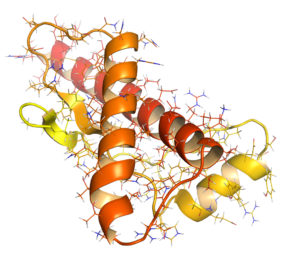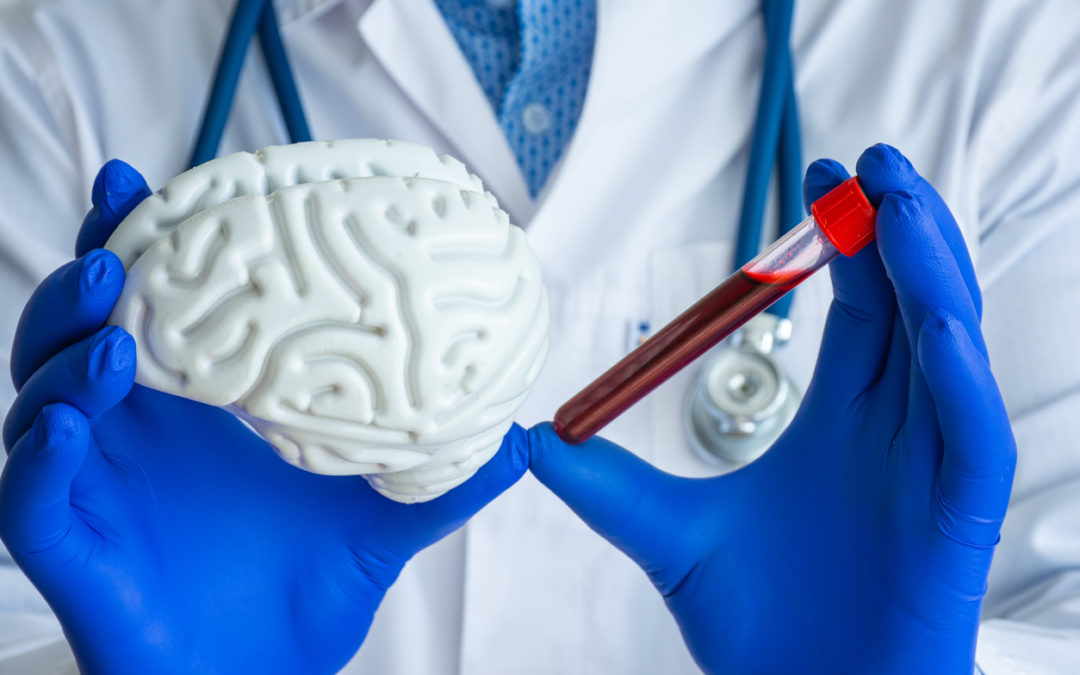What is genetic prion disease?
Prion diseases are a group of rare, degenerative neurological disorders caused by changes in proteins normally found in the brain, called prions. The exact role of prion protein is unknown, but it is believed to be important to the function of the brain. Prion proteins that develop an abnormal shape can accumulate in clusters in the brain, causing damage to neurons, or brain cells.

Human prion protein (hPrP)
Prion disease can be acquired or inherited. Acquired, or infectious prion disease is highly uncommon and is usually caused by consuming infected meat. An example of acquired prion disease is mad cow disease (bovine spongiform encephalopathy (BSE)). Genetic prion diseases are caused by DNA mutations and are inherited from an affected parent, not transmitted from the environment.
What are the symptoms of genetic prion disease?
Symptoms of genetic prion disease are progressive and include coordination and balance problems, difficulty speaking, vision and hearing problems, and dementia. The onset of symptoms is usually in the 30s to 50s. Once diagnosed, death usually follows within months to years. There is currently no cure or treatment to reliably prolong the onset or progression of symptoms.
Genetic prion diseases are grouped into three disorders with similar but distinct symptoms:
- Familial Creutzfeldt-Jakob disease (fCJD): Cognitive impairment and memory problems happen before movement challenges. Cognitive problems progress to dementia and psychiatric disturbances.
- Gerstmann-Sträussler-Scheinker (GSS) syndrome: Symptoms begin with unsteady gait and slurred speech, with cognitive impairment occurring in the late stages of the disease. Psychiatric or behavioral problems are uncommon.
- Fatal familial insomnia (FFI): First symptom is a sudden and severe inability to sleep, followed by disturbances of the autonomic system (such as problems with blood pressure, body temperature, and breathing).
How is genetic prion disease inherited?
Each of the three genetic prion diseases are caused by harmful changes, or mutations, in the PRNP gene. More than 30 mutations have been identified in families with genetic prion disease. Genetic prion disease follows autosomal dominant inheritance. Children and siblings of an affected individual have a 1 in 2, or 50% chance of also having genetic prion disease. Everyone with a mutation in PRNP will develop symptoms of prion disease. However, the onset of symptoms can be variable, even within the same family.
Is preimplantation genetic testing available for genetic prion disease?
In-vitro fertilization with preimplantation genetic testing for monogenic disorders (PGT-M) is available for patients who wish to screen embryos for genetic prion disease. The option of IVF with PGT provides an alternative route to conception that may help reduce stress and anxiety for families at risk for prion disease. The first reported case of a pregnancy conceived by IVF with PGT-M for genetic prion disease was in 2014.
Many presymptomatic individuals at risk of adult-onset neurological disorders, such as prion disease, thoughtfully decide not to undergo genetic testing to determine whether or not they will become affected. These patients may still seek PGT-M for genetic prion disease to reduce the chance of having an affected child through “non-disclosing PGT.” In this case, a patient and their fertility provider can select “low risk” embryos without revealing whether the patient has inherited the mutation in their family. Non-disclosing PGT may not be available at all fertility clinics. Patients should have a conversation with their doctor or genetic counselor to discuss their reproductive options.

Elysia is an independent consultant to Sharing Healthy Genes. She is a board-certified Reproductive Genetic Counselor and Clinical Instructor at the University of North Carolina in Chapel Hill. She received her Bachelor’s in Science at the University of Maryland in College Park and her Master’s in Genetic Counseling from the University of Maryland in Baltimore. In her role as educator, Elysia is involved in didactic and clinical teaching of a variety of learners, including medical students, residents, and fellows, as well as genetic counseling students. As a clinician, Elysia provides genetic counseling services for patients considering pregnancy and who are currently pregnant. Elysia has enjoyed a number of leadership roles in professional committees with the National Society of Genetic Counselors, the American Board of Genetic Counseling, and the Accreditation Council for Genetic Counseling.
